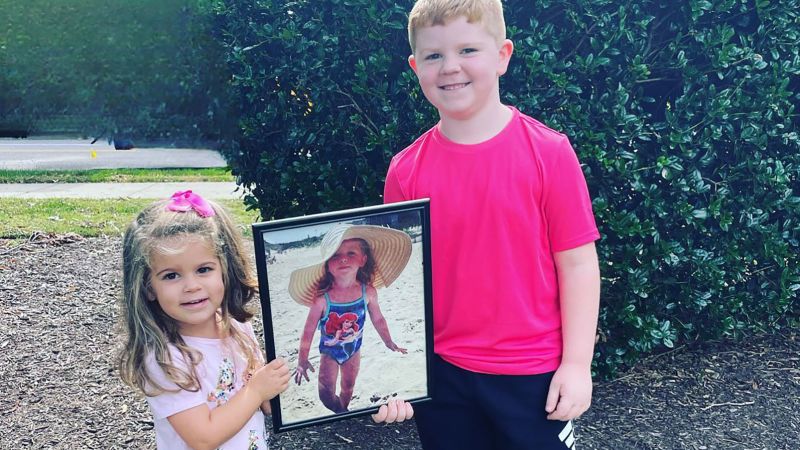CNN
–
Jessica Richman felt dread rushing at her – again.
In October, she witnessed her 3-year-old daughter, Laila, become very lethargic, developed a high fever and started to have shortness of breath. It was a painful reminder for her other daughter, Kayden, who died of the flu in December 2014.
Kayden is the same age as Lily.
“That’s a very similar symptom to Kayden. So, of course, I jumped into high gear,” said Richman.
When Lila’s symptoms started on Halloween, Richman rushed her to an emergency care clinic in their hometown of Newport News, Virginia.
“Her heart rate is high. The fever is very high. They kept him there most of the afternoon to monitor him,” Richman said. “I explained to the doctor who was there that I lost my 3 year old daughter to the flu, so it was very scary for me, for me. He took it very seriously.”
Laila’s medical team diagnosed her with the flu and gave her Motrin to treat her fever and the antiviral drug Tamiflu to treat her infection.
“I recovered pretty quickly, within 24 hours,” Richman said.
Richman’s experience during this flu season was very different from that of 2014, when he lost his girlfriend, Kayden.
One major difference: Kayden wasn’t vaccinated in 2014. Lila got him in September.
“I really think that vaccines have played a very big role,” said Richman, who serves as the nonprofit’s secretary. Family fighting flu.
Although Lila fell ill when she contracted the flu virus weeks after being vaccinated, Richman said, she “recovered quickly,” Richman said, adding that no one else was in their home — including her husband Matt and their 6-year-old son. my son, Parker — caught the flu from Lila. .
They were all vaccinated before Lily got sick.
that US Centers for Disease Control and Prevention It is estimated that at least 16,000 people have died from the flu this season, with at least 79 deaths among children.
seasonal influenza activity It’s still very prevalent across the United States but has declined in most areas in recent weeks. However, public health officials are encouraging the public to get an annual flu vaccine as the best way to prevent this virus.
Many people who don’t get the seasonal flu vaccine are not necessarily anti-vaccine. They may not have time. Such was the case with Kayden in 2014.
That year, Richman and Kayden’s father had the flu shot, but Kayden’s vaccine had to be rescheduled because he had the flu at the time.
“Because at the time I wasn’t used to the flu, I didn’t feel it was so urgent to go and get a flu shot as soon as you recovered,” Richman says. “I put it off a bit.”
One Thursday afternoon a few weeks later, Cayden wasn’t his usual chatty self. The 3-year-old, known as a CadyBug, is exhausted and has a cough. She was staying home with her father from daycare, and he took her to the pediatrician’s office.
Richman said doctors thought Kayden’s symptoms might be due to the flu virus and sent him home without a flu test.
The next morning, Kayden still has a fever. He coughed and kept asking for water. Her father took her back to the pediatrician’s office but she was sent home again.
“No one has tested it for the flu. No one thought it was the flu,” said Richman. “He was discharged on Friday afternoon.”
By the time they got home, Kayden’s symptoms had gotten worse.
“It got worse really fast,” says Richman, “very deep and shallow breathing. You’re not breathing properly.”
Richman said he was driving home from work when he received a chilling phone call from Kayden’s father: Kayden had stopped breathing while he was asleep. He had called 911. Richman arrived home to find an emergency vehicle in front of his house and paramedics working for Kayden.
“He can’t be resuscitated at home,” Richman said. “On the ambulance ride, they didn’t tell me at the time that he couldn’t be resuscitated, but I knew because I was in the ambulance and there was no sound. So I know it’s over.”
When Kayden died, her parents had no idea what had caused the cold.
“It wasn’t until we received the autopsy that she clearly realized that it was a cold that had caused her lungs to fill with mucus to the point that she could no longer breathe,” Richman said. “I didn’t know what happened until we did the autopsy.”
Before Kayden’s tragic death, her mother didn’t realize that a cold could be fatal.
“I was completely shocked,” he said. “I didn’t know this could happen.”
Nearly a decade later, Richman and his family get a joint flu shot every year in Cayden’s memory. They wear pink and share social media posts about it using the hashtag # Oh Godbecause pink is Kaiden’s favorite color.
that The most common flu symptoms Fever, body aches and chills. In some cases, it can cause a lower respiratory tract infection known as pneumonia or directly infect heart cells and brain cells, causing inflammation in those organs, says Dr. Tara Vijayan, MD, an infectious disease physician at UCLA’s David Geffen School of Medicine. Los Angeles, in e-mail.
He added, inflammation can cause the death of body cells.
“Most commonly, if influenza is going to cause serious illness, it’s because it disrupts the lining of the respiratory tract making the lungs more susceptible to other bacterial pneumonias,” says Vijayan. “In general, those who have not been vaccinated and have multiple medical problems or have a compromised immune system are most at risk, but we have seen deaths in young, healthy people.”
He added that people who are older or who are pregnant are also at risk for complications.
Treating patients with severe influenza is a frequent but challenging experience for Dr. Aly Khan, who specializes in internal medicine at one of the primary care network locations at Oak Street Health in Chicago.
“This is a very difficult infection for doctors to monitor,” Khan said, adding that influenza infection can be fatal when a person develops a bacterial infection such as pneumonia or develops severe sepsis.
“We get people coming to the hospital with seizures or encephalitis from the flu. People who come in with significant muscle injuries and damage, like you do when you’re very dehydrated and exhausted,” he said. “Suffice it to say, I’ve seen way more of this than I ever wanted to see as a doctor.”
Khan says it’s not too late to get a flu shot this season if you haven’t already.
“We’re not out of the woods yet,” he said. “Sure, you can still get vaccinated.”
Vijayan has the same feelings.
“Our flu levels were suddenly high in late fall and seem to be winding down, but I would be very worried about another spike in cases this winter,” he said. “It’s never too late to get a flu shot.”

:strip_exif()/i/2005570250.jpeg?f=meta)
